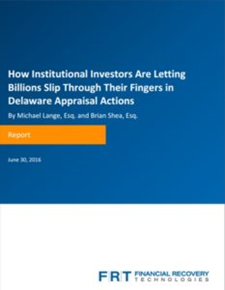
What are appraisal
rights?
Posted on: Aug 16, 2016
What are appraisal
rights?
Appraisal rights entitle shareholders of a target corporation to a
determination of the fair value of their stock by a judicial
proceeding or independent valuation, and obligate the acquiring
corporation to purchase the shares at that determined value. For
example, when an investor believes the value of his or her shares
exceeds the amount being offered in a merger or consolidation, he or
she can exercise appraisal and have the shares’ worth determined and
awarded by a judge. Appraisal rights exist in transactions involving
some amount of cash (rather than stock) consideration. Investors must
be notified if appraisal rights are available no less than 20 days
before the vote on a given deal.
What are the mechanics
of exercising appraisal?
Appraisal petitions are representative actions brought on behalf of
all investors perfecting appraisal, meaning only one dissenting
shareholder needs to file a petition and prosecute the appraisal case
on behalf of others. The petition must be filed within 120 days of the
effective date of the transaction. Within 20 days of filing, the
corporation files an accompanying list of stockholders who have
demanded appraisal and not previously settled. If the petitioner
obtains a negotiated or judicially determined valuation, that result
is available to all others who have perfected their rights.
What are the
differences between appraisal rights and class actions?
Appraisal matters resemble class actions in that investors who
exercise their appraisal rights benefit from the efforts of the named
petitioner, who serves in a role similar to a lead plaintiff, without
themselves having to prosecute the case. These suits differ from
securities class actions and other shareholder matters in that they
don’t involve claims of wrongdoing – they concern your right as a
shareholder to an objective valuation of your investment. Unlike
securities cases, both sides in an appraisal action provide evidence
as to what the price should be. Since the court determines the final
value, this levels the playing field between the investor and the
corporation throughout the appraisal litigation.
The most critical difference between appraisal cases and class actions
is that investors seeking appraisal must affirmatively opt in by
perfecting their rights before the deal vote. Unfortunately,
shareholders often fail to opt in before that vote, forfeiting their
eligibility to later benefit from the Court’s valuation.
Learn more:
Download FRT’s whitepaper
for more information on appraisal rights, including suggested best
practices for addressing appraisal opportunities and perfecting your
appraisal rights. |


